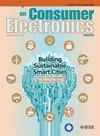Data-Driven Framework for Mitigating EV-Based Load-Altering Attacks on LFC Model of Microgrid
IF 10.9
2区 计算机科学
Q1 ENGINEERING, ELECTRICAL & ELECTRONIC
引用次数: 0
Abstract
The deployment of electric vehicles (EVs) in different grid domains, such as microgrids (MGs), has increased considerably. To fully realize the advantages of EV ecosystems and integrate them with the MG control schemes, the use of information and communication technologies is required, making the EV ecosystem prone to data manipulation and malware injection. On this basis, the potential vulnerabilities of MGs, such as the load frequency control (LFC) model, that plays an important role in keeping a balance between generation and demand, will be discussed. Then, a switching attack vector originating from EV ecosystems is leveraged to launch coordinated EV-based load-altering attacks (EV-LAAs) based on the frequency of lightly damped modes in MGs. A multi-agent cooperative reinforcement learning (RL) control framework based on the actor-critic proximal policy optimization (PPO) model is designed to mitigate the switching attack vectors. A Lyapunov function is developed using the PPO to provide monotonic policies and guarantee MG’s stability. The performance and robustness of the proposed method are compared with a model-based controller and a centralized RL framework for several attack scenarios during disturbances in wind speed, solar irradiation, and parametric uncertainties under a testbed that integrates a virtual sphere (vSphere) of an EV ecosystem with an islanded MG simulated in OPAL-RT 5650.微电网LFC模型中基于ev的负载改变攻击的数据驱动框架
电动汽车(ev)在不同电网领域的部署,如微电网(mg),已经大大增加。为了充分发挥电动汽车生态系统的优势,并将其与电动汽车控制方案相结合,需要使用信息和通信技术,这使得电动汽车生态系统容易受到数据操纵和恶意软件注入的影响。在此基础上,将讨论在发电和需求之间保持平衡方面发挥重要作用的负荷频率控制(LFC)模型等MGs的潜在漏洞。然后,利用源自电动汽车生态系统的切换攻击向量,基于mg中轻阻尼模式的频率发起基于电动汽车的协同负载改变攻击(EV- laas)。为了缓解攻击向量的切换,设计了一种基于行为者批评近端策略优化(PPO)模型的多智能体合作强化学习(RL)控制框架。利用PPO构造了一个Lyapunov函数来提供单调策略并保证MG的稳定性。在一个集成了电动汽车生态系统的虚拟球体(vSphere)和OPAL-RT 5650模拟的孤岛MG的测试平台上,在风速、太阳辐射和参数不确定性干扰下,将该方法的性能和鲁棒性与基于模型的控制器和集中式RL框架进行了比较。
本文章由计算机程序翻译,如有差异,请以英文原文为准。
求助全文
约1分钟内获得全文
求助全文
来源期刊
CiteScore
7.70
自引率
9.30%
发文量
59
审稿时长
3.3 months
期刊介绍:
The main focus for the IEEE Transactions on Consumer Electronics is the engineering and research aspects of the theory, design, construction, manufacture or end use of mass market electronics, systems, software and services for consumers.

 求助内容:
求助内容: 应助结果提醒方式:
应助结果提醒方式:


